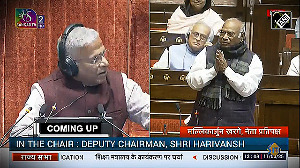Bankers on Thursday told the Reserve Bank of India that they may not be able to reduce deposit rates substantially as they fear depositors shifting from banks to small savings instruments such as postal deposits and the public provident fund.
During a pre-credit policy review meeting on Thursday, bank chiefs told the RBI team led by deputy governor Rakesh Mohan that they needed to mobilise deposits as they were facing additional demand for funds with other sources drying up.
With reductions in repo, reverse repo and the cash reserve ratio, banks have reduced deposit rates by up to 300 basis points.
On high-cost bulk deposits, public sector banks, which have pared lending rates by upto 150 bps, are now quoting a rate of 7.5 per cent for one year. "When government schemes are offering 8 per cent rate, banks cannot go below that. If we cut rates further, we will not be able to attract fresh funds and will also face the prospects of depositors exiting in favour of small savings instruments," said a banker who attended the meeting.
Apart from Indian Banks' Association CEO K Ramakrishnan, ICICI Bank Managing Director and CEO K V Kamath and HSBC India Chief Naina Lal Kidwai were among the top bankers who attended the meeting.
According to sources, the banks did not have a big wish list. As the monetary authority and banking sector regulator, the RBI has been proactive in infusing resources into systems, reducing the cost of funds and giving flexibility in restructuring accounts of viable units which face temporary cash flow problems, said a bank executive.
Bankers informed the RBI that resources were flowing in and liquidity in the system was adequate. The business, especially on credit side, has shown a year-on-year growth of 24 per cent till early January 2009. The problems of the medium and small enterprises as also the sectoral review were on the agenda. While textiles and small units are facing stress due to a sharp drop in external demand, steel and cement units are beginning to show some signs of recovery, a banker said.
The discussion also dealt with the likely inflation trend till March 2009. The fall in commodity prices has eased the pressure on inflation. Inflation, measured by the wholesale price index, fell to a 48-week low of 5.24 per cent for the week ended January 3, 2009, against 5.91 per cent a week ago.






 © 2025
© 2025